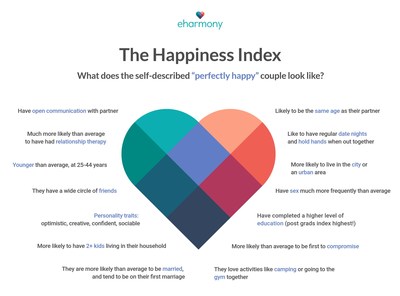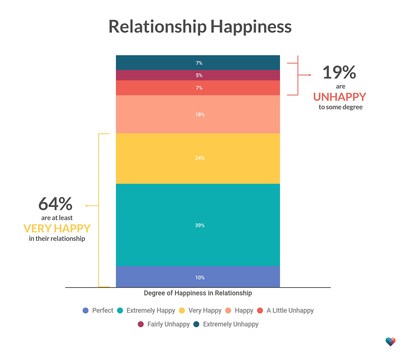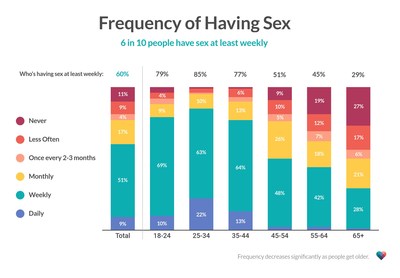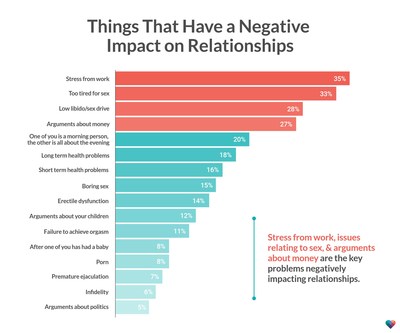LOS ANGELES, Feb. 8, 2018 /PRNewswire/ -- Americans may be growing more cynical of the political process, the state of the economy, or perhaps of the environment, but that hasn't stopped them from believing in the one thing more fickle than them all: LOVE.
A new national report "The Happiness Index: Love and Relationships in America" commissioned by eharmony and conducted by Harris Interactive, shows that 64 percent of Americans are "very happy" in their romantic relationships with a partner or spouse and nearly 50 percent report being happy with their sex lives.




"At eharmony, we talk a lot about happiness in relationships and how to keep them going strong," says Grant Langston, chief executive officer for eharmony. "We wanted to put society to the test and get a sense of how couples are living and loving in America today. Perhaps the most surprising finding is that gender and age dynamics in relationships are evolving, debunking misconceptions long held about both men and millennials."
The new survey reveals that millennials ages 25 to 34 are the happiest in their relationships. Meanwhile, while 19 percent of Americans report being unhappy in their relationships, they are finding it worthwhile to stay together for the long haul: the average length of a relationship is 18 years overall, spiking up to 36 years for respondents over the age 65.
In addition, the survey identified the secrets to success for the 26 percent of respondents who said they were "perfectly happy" in their long-term romantic relationships. Perhaps unsurprisingly, they tended to have taken the time to get to know one another before taking the plunge into marriage, were the same age as their partner or spouse, and had many shared interests, making time for each other even after having children. On the flipside, only six percent of respondents characterized themselves as "desperately unhappy" in their relationships, and were likely to have prioritized companionship over love, lacked intimacy, and were less likely than average to be married.
Key takeaways from the new study include:
How happy are Americans in their relationships?
Love is a huge factor in Americans' overall happiness. A sense of commitment, having a healthy sex life and feeling financially secure are also key factors that directly correlate with happiness.
- 64% of Americans reporting they are "very happy" in their relationship, and just 19% say they're unhappy to some degree
- Millennials aged 25-34 report having the happiest relationships of all
- People living in cities tend to be happier in their relationships
- Being "in love" correlates most with happiness: much more than relationship satisfaction
- Nearly 50 percent of all people are happy in their sex lives
- Almost 8 out of 10 say they got hitched because they were in love
- Happiness peaks among those in committed relationships of any type including, those who have been in a relationship for 5 years or less, married couples and those who are the exact same age as their spouse or partner
- Happiness is greater among those who are employed and those who consider themselves to be the main household breadwinner
- Household income and relationship happiness have a direct correlation, with the most happy couples making over $200K yearly
- As might be expected, high levels of happiness correlate with less arguing / fighting; but we also see less of this type of behavior among those who are least happy
- Almost half are pretty happy with their sex life, although happiness decreases as people get older
Why are men and millennials most positive about relationships?
"We're seeing a shift in the way men communicate in romantic relationships," adds Langston. "This is largely being driven by the millennial generation, so it's no surprise that the data reflects this positive change."
- Men tend to be more positive, happy, and satisfied in their relationships than women: 80% of men (vs. 76% of women) reported that they're "in love" with their partner or spouse
- 75% of men (vs. 71% of women) say they have a "warm/comfortable relationship" with their partner or spouse 71% of men (vs. 64% of women) say their relationship is rewarding
- Millennials (25-34), Gen Yers (35-44) and men are relatively more interested in learning new things about sex
- Men are twice as likely as women to agree that they enjoy sex more than their partner
- Younger people and men are more likely to say they feel comfortable discussing sex matters with other people
- Younger people are 2-3x more likely to discuss relationship problems with other people even though they are fighting nearly twice as much as other couples
- Men were also likely to seek out a friend of family member to discuss their woes
- Men are almost twice as likely as women to have relationship therapy, and the incidence is highest among millennials/Gen Yers aged 25-44, more than a quarter of which have already sought professional help
What's keeping American couples together?
While stress from work, being too tired for sex, and money arguments are the key issues negatively impacting relationships, Americans are finding it worthwhile to stick together for the long haul: the average length of a relationship was 18 years overall, spiking up to 36 years for respondents over age 65.
When it comes to seeking help, 17% have had relationship therapy, mostly as a couple. Men are almost twice as likely as women to have relationship therapy and incidence is highest among millennials/Gen Yers aged 25-44 and those on their first marriage. Almost two-thirds of those who have not had relationship therapy would consider it in future if it were necessary. What's causing stress?
- 35% report stress from work as having the most negative impact
- 33% report being too tired for sex
- 27% report arguments about money
- 5% report politics as a point of contention
Is romance still alive?
Yes! While women tend to show more signs of daily affection, such as saying "I love you," men are bringing the romance. In fact, they are much more likely to hold hands with their partner, share an intimate kiss, write a love note, take their partner out on date night and even buy small gifts, just because.
- 68% of respondents say "I love you" daily
- 65% report kissing on the mouth for a second or two each day
- 72% say they'll hold hands when out for a walk
- Only 1 in 5 argue with their spouse or partner weekly
- Arguing spikes for Gen Yers ages 35 to 44 then steadily declines with age
- Less fighting correlates with being happier, but people that are extremely unhappy fight less
- Men were more likely to report romantic gestures on a monthly basis, such as writing an affectionate note (67%) or holding hands on a walk (80%)
- Men say they are more likely to compromise when having a disagreement with their partner
- Millennial men ages 25 to 34 are the most open when communicating with their spouse
- People are more likely to bicker and have polite disagreements than anything more serious, and these behaviors decline as they get older
Does family impact love?
The survey found that happiness is greatest for those in a first marriage, while those who remarry tend to get along better with their spouse. Couples with either one child or more than five tend to argue less than those who have two to four.
- Happiness is greater among those on their first marriage and those with more than one child (2-4)
- Remarried people are more likely to get along with their spouse; while couples with more than one child argue more often
- The more children you have the more extreme/threatening arguments become
- Happiness is greatest with 3 children
Does more sex mean greater happiness?
While approximately three quarters of the happiest people in America are having sex weekly, the data also shows that having sex regularly does not necessarily mean you are happy in your relationship.
- 62% of extremely unhappy people report having sex daily or weekly, coming in second to the happiest couples in America in terms of frequency
- Couples that land in the middle of the happiness scale are having sex weekly at half that rate and are also the most likely to have no sex at all
Can money buy love?
While the survey results show a correlation between income and happiness in relationships, nearly three-quarters of Americans still report having a warm and comfortable relationship, with minimal variances across household income.
- Those with the highest household income report the highest level of both happiness and satisfaction with their relationships
- 71% of people with a household income of more than $200,000 say they are completely in love, yet those making less than $30,000 a year come in second at 65%
- Employed main breadwinners of a family claim to be the happiest overall in relationships
- While men are three times more likely than women to be the main breadwinner in a household, nearly half of women surveyed are also employed and another quarter are in retirement
Want to learn more about the "The Happiness Index: Love and Relationships in America"? Visit https://www.eharmonyhappinessindex.com/ and join the conversation on Facebook, Twitter, and Instagram using #happyinlove.
About "The Happiness Index: Love and Relationships in America" Report
"The Happiness Index: Love and Relationships in America" report was commissioned by eharmony and conducted by Harris Interactive. The survey was fielded online between Nov. 27 and Dec. 3, 2017 with 2,084 online interviews conducted. Participants qualified if they were aged 18+ and were married or in a long-term relationship. Results were weighted to be nationally representative by age and gender.
About eharmony
Los Angeles, California-based eharmony helps people find meaningful relationships that enrich their lives. Founded in 2000, eharmony is a pioneer in using algorithms to create highly compatible relationships based on key dimensions of personality that predict the most compatible, highly successful, long-term relationships. eharmony operates in the United States, Canada, the United Kingdom, Singapore and Australia. For more information visit www.eharmony.com or download the app available on iOS and Android.
SOURCE eHarmony
Related Links
WANT YOUR COMPANY'S NEWS FEATURED ON PRNEWSWIRE.COM?
Newsrooms &
Influencers
Digital Media
Outlets
Journalists
Opted In
Share this article